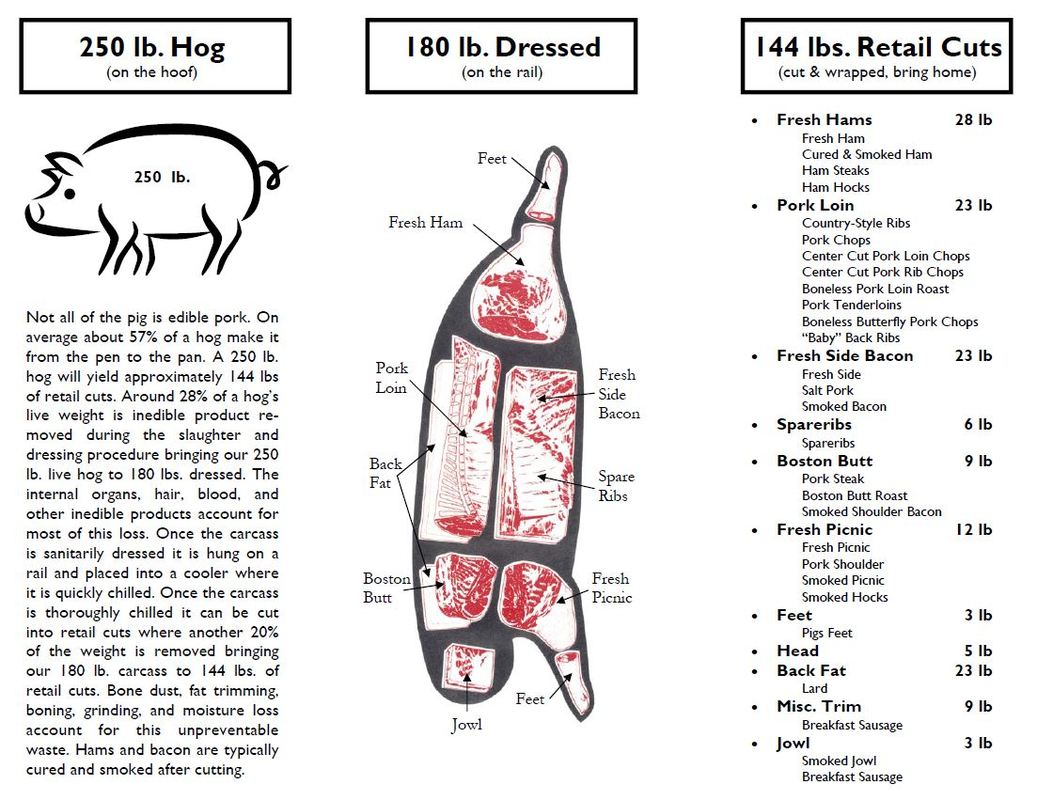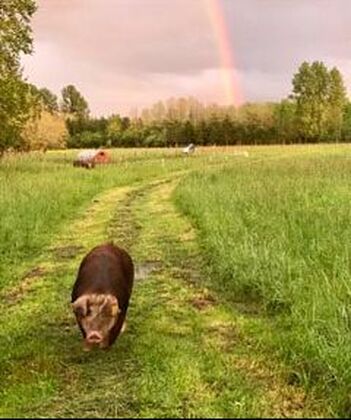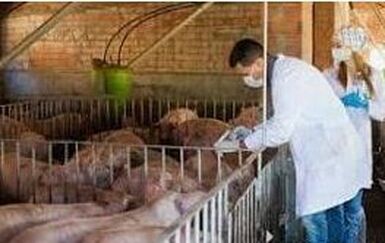We may not have made the cut as breeders, but we certainly will make
the cut to fill your freezer with the best tasting pork
We are extremely choosy with our piglets that we keep as breeders and for this reason, we are able to offer pork by the whole OR half pig share. We are blessed to work with an amazing mobile slaughter unit that come directly to our farm to give the hogs the most humane death possible, without the stress that comes from handling and transporting. We truly are a farrow to finish farm, keeping only the best as our breeders.
The added benefit of buying a whole OR half share is that you get farm fresh pasture raised meat at a discounted price, without all the fuss of raising your own hog or buying the hormone injected, confined pork, that we see at the grocery store. We never use any antibiotics, steroids, or growth hormones. We are a closed herd, which enables us to give no vaccinations to our feeder pigs as we grow them out to fill your freezers with the sought-after old-world flavor; how pork should taste!
Pricing is based on what we have into our hogs and we will continue working hard to keep our prices down. This is an investment for your family and we are truly honored to have the chance to fill your freezers with wholesome, natural pasture raised pork!
Repeat Customers * always get a discount:
You know the drill: contact me directly via text: 541 609-0624 or email: [email protected]. Without your continued support, I would never have this amazing opportunity to raise these phenomenal Heritage Hogs out in the fields!
Processing Fees as of January 27, 2024, paid directly to the butcher upon picking your meat up:
Kill Fee = $100 whole / $50 half
Cut & Wrap = .88 cents a pound
Curing = $1.00 a pound
Disposal Fee = $25.00
Mobile Butcher:
Farmer's Helper, 390 Lasalle Street, Harrisburg, OR 97446 * THIS IS WHERE YOU WILL PICK UP YOUR PACKAGED HOG
The added benefit of buying a whole OR half share is that you get farm fresh pasture raised meat at a discounted price, without all the fuss of raising your own hog or buying the hormone injected, confined pork, that we see at the grocery store. We never use any antibiotics, steroids, or growth hormones. We are a closed herd, which enables us to give no vaccinations to our feeder pigs as we grow them out to fill your freezers with the sought-after old-world flavor; how pork should taste!
Pricing is based on what we have into our hogs and we will continue working hard to keep our prices down. This is an investment for your family and we are truly honored to have the chance to fill your freezers with wholesome, natural pasture raised pork!
Repeat Customers * always get a discount:
You know the drill: contact me directly via text: 541 609-0624 or email: [email protected]. Without your continued support, I would never have this amazing opportunity to raise these phenomenal Heritage Hogs out in the fields!
Processing Fees as of January 27, 2024, paid directly to the butcher upon picking your meat up:
Kill Fee = $100 whole / $50 half
Cut & Wrap = .88 cents a pound
Curing = $1.00 a pound
Disposal Fee = $25.00
Mobile Butcher:
Farmer's Helper, 390 Lasalle Street, Harrisburg, OR 97446 * THIS IS WHERE YOU WILL PICK UP YOUR PACKAGED HOG
Hanging weight is the amount the pig weighs when it arrives at the butcher. You pay the farm a price per pound for the hanging weight of the hog. Cut and wrap weight is the quantity of actual meat that you receive to put in your freezer and is paid directly to the butcher. We target a hanging weight of 200 pounds, but our weights will vary between 180 pounds to 225 pounds.
Please scroll to the bottom of the page to read a great article, "How Much Meat" by Oklahoma State University. The information represents an average. A typical slaughter weight of 250 pounds live, yielding a whole hog of about 180+/- lbs hanging weight. If you take just the prime commercial cuts, a whole hog will yield approximately 120 – 130 lbs of meat, and a half hog is typically 65 – 75 lbs of meat. If you take the whole pig, nose to tail, that will give you about 140 lbs which will include great things like the hocks, soup bones, leaf lard (for pie crust), jowls, head, and other things. There are many variables that play into the actual finished weight such as the size of the pig, and how you choose to have the meat processed and packaged.
On the next day following our mobile butcher appointment, I will email you with the hanging weight. Then you will call the butcher directly giving them your custom needs, such as: cutting / wrapping instructions, curing, smoking, these are all done to your specifications. Depending on your custom order, your meat will be available for pick-up in Harrisburg within 2 - 4 weeks of time. If you are coming from out of town, I ask that you bring coolers to haul your meat in.
Please scroll to the bottom of the page to read a great article, "How Much Meat" by Oklahoma State University. The information represents an average. A typical slaughter weight of 250 pounds live, yielding a whole hog of about 180+/- lbs hanging weight. If you take just the prime commercial cuts, a whole hog will yield approximately 120 – 130 lbs of meat, and a half hog is typically 65 – 75 lbs of meat. If you take the whole pig, nose to tail, that will give you about 140 lbs which will include great things like the hocks, soup bones, leaf lard (for pie crust), jowls, head, and other things. There are many variables that play into the actual finished weight such as the size of the pig, and how you choose to have the meat processed and packaged.
On the next day following our mobile butcher appointment, I will email you with the hanging weight. Then you will call the butcher directly giving them your custom needs, such as: cutting / wrapping instructions, curing, smoking, these are all done to your specifications. Depending on your custom order, your meat will be available for pick-up in Harrisburg within 2 - 4 weeks of time. If you are coming from out of town, I ask that you bring coolers to haul your meat in.
happily raised on pasture
Processing Dates, updated 04/07/2024:
May 2024 = 1 whole or 2 halves available
Our hogs are farrowed naturally on our farm and will be processed by a mobile slaughter unit that comes directly onto our farm. We work too hard in raising our hogs in a natural, stress-free environment to ever haul them offsite to a processing plant.
Please shoot me a text to get your name on the list!
541 609-0624
May 2024 = 1 whole or 2 halves available
Our hogs are farrowed naturally on our farm and will be processed by a mobile slaughter unit that comes directly onto our farm. We work too hard in raising our hogs in a natural, stress-free environment to ever haul them offsite to a processing plant.
Please shoot me a text to get your name on the list!
541 609-0624
What you should ask your farmer & Helpful tips for the farmer:
* What do you feed?
Look for the farmer to say naturally milled feeds, look for barley, wheat, and peas in the mix. IF any farmer mentions the commercially bagged feed, such as, Purina, Nutrena, from the farm store - - RUN the other way, no exceptions as this is your family's health. I am also against soy as this is just a cheap filler and doesn't belong in the hog's diet.
*How are the hogs raised?
I know I go overboard, BUT we do not want penned up pork! Come on farmers, stop being lazy and get those hogs out there working the land! You drive through the countryside, and you always see sheep, goats, and cattle in the fields, BUT they PEN UP THE SINGLE MOST UNDERRATED ANIMAL OF ALL TIME? Makes absolutely no sense to this pig farmer! I tell everyone NO CATTLE PANELS - if I see cattle panels, I will bet you dinner those hogs never rotate pastures. It is too hard to move t-post and cattle panels every 6 to 9 days. Look for flexible fencing and drive by the farm often. Do you see your farmer out in the fields with the hogs? Rotating pastures and re-seeding?
*Do you vaccinate your hogs?
IF YOU TAKE CARE OF YOUR HERD, THE HERD WILL TAKE CARE OF YOU! We do not believe in vaccinations, BUT we are a closed herd/farm. This means we do not allow tours on our farm and absolutely no animals are ever brought onto our property. I am extremely protective of my herd as once my bloodlines are gone - that is it, there are no more.
*Do you worm your hogs? If so, with what?
Once again, I do not want ANY injections into my hogs, this is my personal preference, but we are eating the meat and natural is best. I looked high and low for an organic hog worming method and finally came up with a great one, which I only use IF eggs show up in the fecal sample. Buy a high-powered microscope, vet serum and you are set! I am fascinated by this, so you will see me out in the fields with rubber gloves and a sharpey pen. I collect the poop from the hog, write the name on the outside of the rubber glove and head inside to start sampling. Unfortunately, all my supplies got sent to the garage as my husband said it just wasn't right to be sampling poop in the living room on the coffee table. SHEESH, you think he would be grateful that I moved it from our kitchen table. HA!!
I also purchase kits from Amazon that I grab the poop and mail in with their name. You will get your results within 2 weeks, depending on the number of poop orders that they have.
*LET'S TALK BUTCHER TIME:
I will never forget starting out as a small farm. I called each mobile butcher shop on the phone and then went in person to interview them. I truly believe most of these shops thought I was PETA coming after them. I knew in my heart what had to be done and by golly, it was my job to ensure that these hogs would NEVER endure any stress at all. I put my heart and soul into raising these Heritage Hogs and I would be darned if I was going to allow a big butcher company to come to my farm and stress my hogs out, it just wasn't happening!
****MORE TO COME!! I want to head out in the fields and be with my amazing hogs. CHEERS TO ALL!
Look for the farmer to say naturally milled feeds, look for barley, wheat, and peas in the mix. IF any farmer mentions the commercially bagged feed, such as, Purina, Nutrena, from the farm store - - RUN the other way, no exceptions as this is your family's health. I am also against soy as this is just a cheap filler and doesn't belong in the hog's diet.
*How are the hogs raised?
I know I go overboard, BUT we do not want penned up pork! Come on farmers, stop being lazy and get those hogs out there working the land! You drive through the countryside, and you always see sheep, goats, and cattle in the fields, BUT they PEN UP THE SINGLE MOST UNDERRATED ANIMAL OF ALL TIME? Makes absolutely no sense to this pig farmer! I tell everyone NO CATTLE PANELS - if I see cattle panels, I will bet you dinner those hogs never rotate pastures. It is too hard to move t-post and cattle panels every 6 to 9 days. Look for flexible fencing and drive by the farm often. Do you see your farmer out in the fields with the hogs? Rotating pastures and re-seeding?
*Do you vaccinate your hogs?
IF YOU TAKE CARE OF YOUR HERD, THE HERD WILL TAKE CARE OF YOU! We do not believe in vaccinations, BUT we are a closed herd/farm. This means we do not allow tours on our farm and absolutely no animals are ever brought onto our property. I am extremely protective of my herd as once my bloodlines are gone - that is it, there are no more.
*Do you worm your hogs? If so, with what?
Once again, I do not want ANY injections into my hogs, this is my personal preference, but we are eating the meat and natural is best. I looked high and low for an organic hog worming method and finally came up with a great one, which I only use IF eggs show up in the fecal sample. Buy a high-powered microscope, vet serum and you are set! I am fascinated by this, so you will see me out in the fields with rubber gloves and a sharpey pen. I collect the poop from the hog, write the name on the outside of the rubber glove and head inside to start sampling. Unfortunately, all my supplies got sent to the garage as my husband said it just wasn't right to be sampling poop in the living room on the coffee table. SHEESH, you think he would be grateful that I moved it from our kitchen table. HA!!
I also purchase kits from Amazon that I grab the poop and mail in with their name. You will get your results within 2 weeks, depending on the number of poop orders that they have.
*LET'S TALK BUTCHER TIME:
I will never forget starting out as a small farm. I called each mobile butcher shop on the phone and then went in person to interview them. I truly believe most of these shops thought I was PETA coming after them. I knew in my heart what had to be done and by golly, it was my job to ensure that these hogs would NEVER endure any stress at all. I put my heart and soul into raising these Heritage Hogs and I would be darned if I was going to allow a big butcher company to come to my farm and stress my hogs out, it just wasn't happening!
****MORE TO COME!! I want to head out in the fields and be with my amazing hogs. CHEERS TO ALL!
How Much Meat Does a hog yield?
Pasture Raised vs Confined pork, which would you choose for your family?
|
Thank you ORGANIC CONSUMERS ASSOCIATION for this article, published June 11, 2018 on grocery store pork supplied by CAFO - concentrated animal feeding operation, otherwise known as a factory farm:
How Pharma Hides Data About Farm Antibiotic Use On Wednesday last week, the nonprofit Natural Resources Defense Council revealed that pig herds in the United States receive almost as many antibiotics as people in this country do. That’s bad news, especially since most of the pigs receiving antibiotics aren’t sick, but instead are getting the drugs to prevent infections in intensive farming. Those drugs don’t keep the US pig herd healthy—major diseases have increased year over year since 2000—and all those antibiotics are increasing the amount of drug-resistant bacteria that arise on pig farms and that are routinely found on meat. None of that is good news. But there’s a second story hidden in the NRDC report that is worse: The advocacy organization had to jump over hurdles to get the data to explain the effects of that drug use. Even in the era of Big Data, the information we‘re allowed to have about how antibiotics are used in US animals is limited, incomplete, and hostage to commercial interests—all of which keeps Americans from fully understanding how bad raising practices put our health at risk. It doesn’t have to be that way. Other nations track and report agricultural antibiotic use, livestock diseases and human health impacts—not only in granular detail, but in unified data sets that make it easy to see how what’s happening on farms affects the wider world. |


